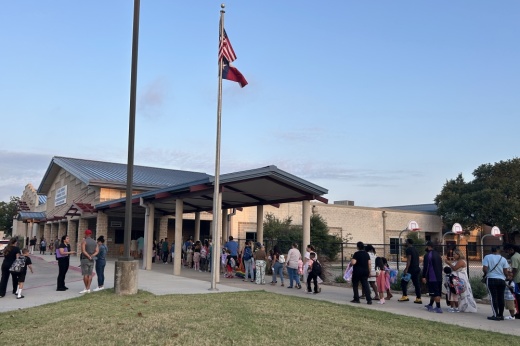In November, Round Rock ISD will ask voters to approve a $998 million bond package.
Unlike past bond proposals, the district does not want to build new schools. Instead, the monies would be used to address the needs of all of the district's campuses, including the 28 of 55 schools approaching a “critical” need of repair.
The bond comes after RRISD made $30 million in cuts to its 2024-25 budget to break even amid stagnant state funding and declining enrollment.
“If we have a leaky roof at McNeil High School, or if we have a chiller at one of the campuses that breaks down and we have to replace it, we have to tap into our [maintenance and operations budget], which is very tight,” RRISD Superintendent Hafedh Azaiez said.
Breaking it down
The bond package, which was approved to go on the November ballot by the RRISD board of trustees Aug. 15, is the first in six years for the district. The last bond, passed in 2018, totaled $508.4 million and went to alleviating crowding in elementary schools, improving high schools, constructing a natatorium and other investments.
With the 2024 proposal, the district aims to address needs of aging facilities and access to career and technical education, as well as replace aging technology. A new athletic facility is also proposed for the district’s east side.
RRISD Place 6 Trustee Tiffanie Harrison said that deferred maintenance of RRISD facilities would only become more expensive to tackle if it is not addressed in the near future.
“We have not had a bond for six years,” Harrison said. “The cost of construction, the cost of materials increasing [and] the cost of labor is increasing rapidly.”
Zooming in
The upcoming bond package includes:
Proposition A: $798.3 million
- HVAC, roofing, electrical and plumbing replacements
- Fresh paint, new ceiling tiles and flooring at aging facilities
- New school buses
- New career and technical education facility
- Instructional technology replacements
- Technology infrastructure replacements
- Improvements to internet speed, connectivity and security of district network
- Fine arts improvements and upgrades including stage lighting, sound systems
- Upgrading competition fields to turf
- Locker room upgrades
- Construction of a standalone multipurpose athletic facility
Round Rock ISD was one of few in Central Texas to pass a balanced budget this year, although doing so required cutting $30 million in operating expenses.
“Having served on this board—this is my sixth budget to vote on—this is the first time that we’ve had a balanced budget in a while,” RRISD Board President Amber Landrum said.
Azaiez said the district was able to make budget cuts without having to lay off employees, although some were reassigned to other positions.
No extracurricular programs were cut either, he said, although 5% to 10% budget reductions were implemented across the district.
By passing a balanced budget, the district reduced its reliance on its fund balance, said RRISD Chief Financial Officer Dennis Covington.
While the district does retain a fund balance, these funds are not allowed to be spent on large projects. Per the Texas School Coalition, fund balances must be used to responsibly manage cash flow or cover operations during emergencies.Explained
Should the bond pass, it would free up money in the district’s already tight budget. Funds spent on salaries and benefits of RRISD employees have increased by about 14% over the last decade, district documents show.
Covington said meaningful cuts to remedy an initial $30 million shortfall would require eliminating positions and reassigning employees. Last year, the district passed a budget with a $21 million deficit.
RRISD estimates that the state will provide about half the funding the district received a decade before, despite having similar enrollment. The district is also expecting to pay an estimated $19.9 million back to the state due to recapture, a process also known as Robin Hood that takes excess tax dollars from property-rich districts and redistributes them to poorer districts.
With a lack of an increase of state funding and rising operations costs, Azaiez said school districts are put into difficult positions when it comes to budgeting for positions and performing maintenance.
Azaiez said an influx of bond dollars would allow the district to better distribute its maintenance and operations funds, as the majority of the money would go to replacing large-scale items, such as ventilation systems and roofs.
By the numbers
Round Rock ISD estimates that the state will provide an amount of funding for 2024-25 equal to about half of what the district received a decade before, despite having similar enrollment. Details for this fiscal year’s budget and the budget for 10 years prior include:
Fiscal year 2014-15:
- Enrollment: 46,840
- Federal revenue: $3,100,000
- State revenue: $99,183,565
- Local revenue: $259,039,642
- Total revenue: $361,323,207
- Total expenditures: $361,119,288
- Surplus: $202,919
- Enrollment: 46,485
- Federal revenue: $3,006,000
- State revenue: $52,153,000
- Local revenue: $410,889,499
- Total revenue: $466,048,499
- Total expenditures: $466,048,499
- Recapture: $19,996,000
As the largest bond package ever proposed by the district, the $998 million has prompted strong reactions from the RRISD community.
Trina Martin, a former Round Rock High School parent and fine arts education advocate who served on the citizens bond committee, suggested many of the proposed projects could have already been paid for by the district in its regular budget if the state had increased the base amount of per-student funding.
Jill Farris, a district parent who participated on the citizens bond committee and previously ran for a board seat in 2022, said she would have preferred a bond amount closer to $600 million, but was not altogether against the proposal.
She encouraged parents who have a vested interest in projects to advocate for them to the school board, especially if there is a need on their child’s campus.
District parent and substitute nurse Natalie Bogue said she is generally in support of all four propositions, especially Propositions A and B, as the latter would allow the district to no longer hold athletic games on Thursday nights. An additional competition facility would prevent late-night games and shorten the driving distance to Kelly Reeves Athletic Complex for families who live on the other side of the district.
As a resident of 20 years, Bogue said the timing and size of the bond feels proportional to the level of growth in Round Rock.
“I feel like we did a great job at the beginning, getting facilities out there, and it’s just time for a lot of these things to be updated,” she said.
Bogue said she is also not feeling fatigued by the frequency of bonds put forth to voters in the area, as the city of Round Rock and Williamson County have both sent large bond packages to voters in recent years. She says this is because she researches the proposals and finds them worth the expense.
Quotes of note
“I don’t know how you could feel good about not voting for it, knowing that there are parts of our school district that are in such disrepair,” said Jill Farris, RRISD parent and CBC member.
“You don’t have to look very far to see people struggling to pay the rent, looking for a second job, struggling to put food on the table for their children. I think the bond that’s being asked for here is too large, given these economic circumstances,” said Danielle Weston, RRISD Place 7 Trustee.
What’s next
All four propositions will appear on the Nov. 5 ballot, along with a board election for trustees to serve in Places 1, 2 and 7.
Azaiez said the district could borrow up to $1 billion for bond projects and still lower the 2024-25 tax rate by one cent—to $0.8849 per $100 of valuation. While the district will not ratify its tax rate until this September, a bond approval would allow RRISD to lower the interest and sinking tax rate, also known as the debt service rate.
Lindsey Ledyard, a district parent and co-chair of the CBC, said that should the bond fail, the needs identified within the district will not go away.
“If anything, the needs continue to grow and the cost continues to grow,” Ledyard said.





